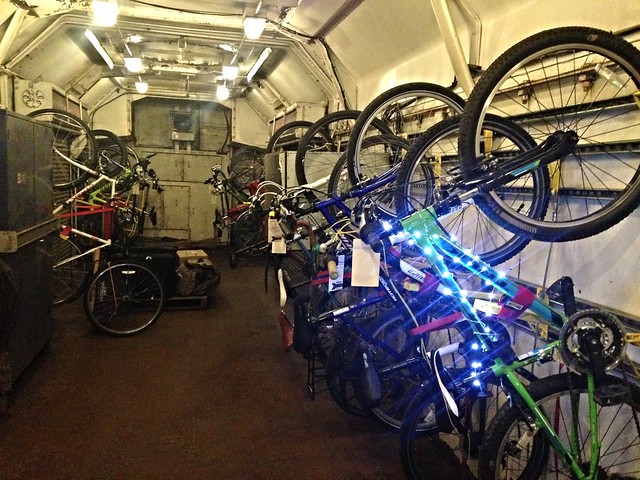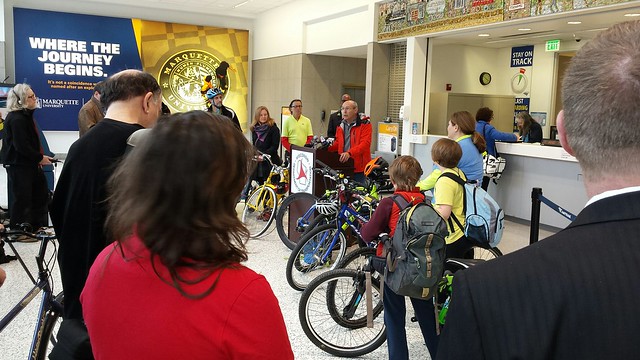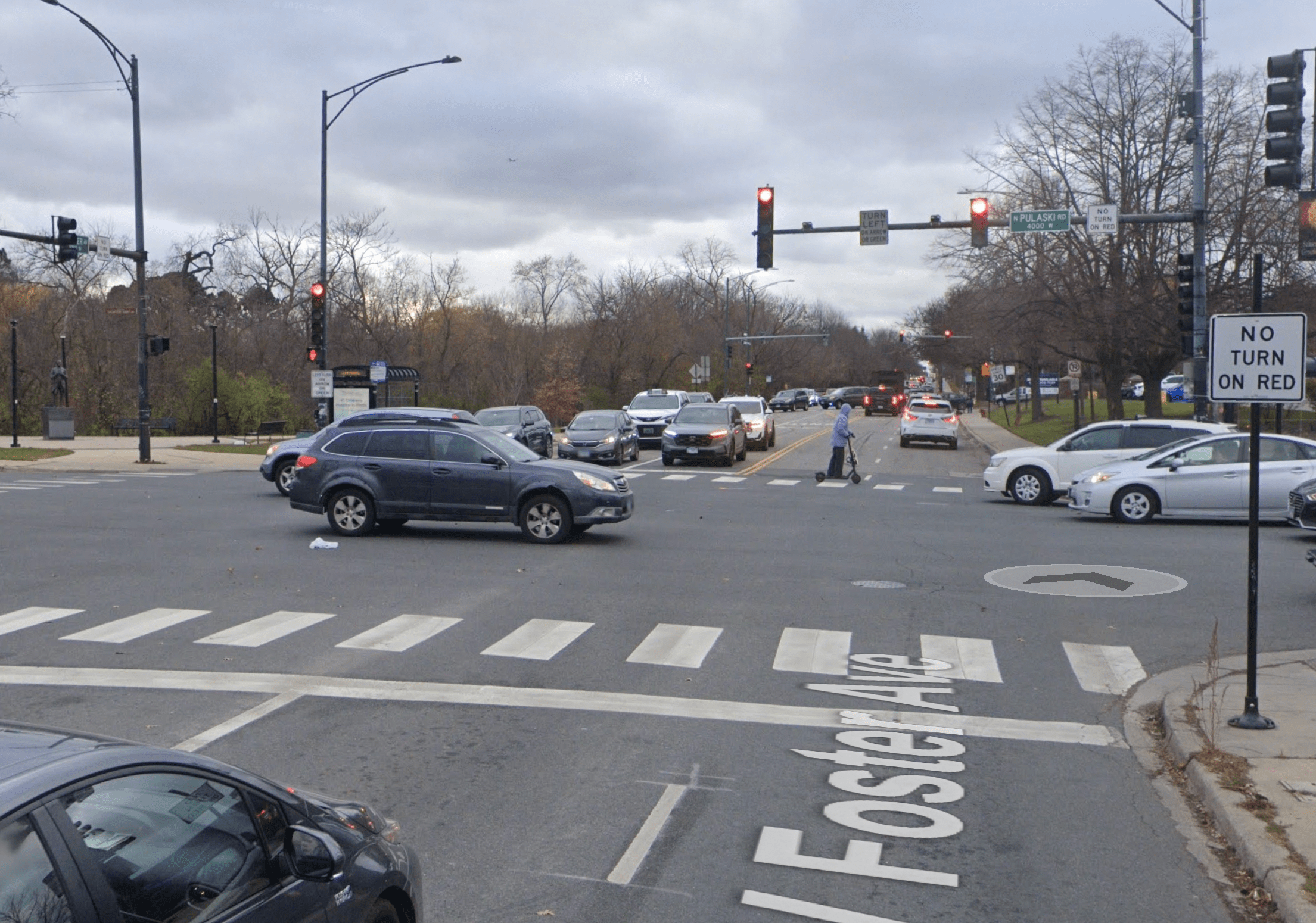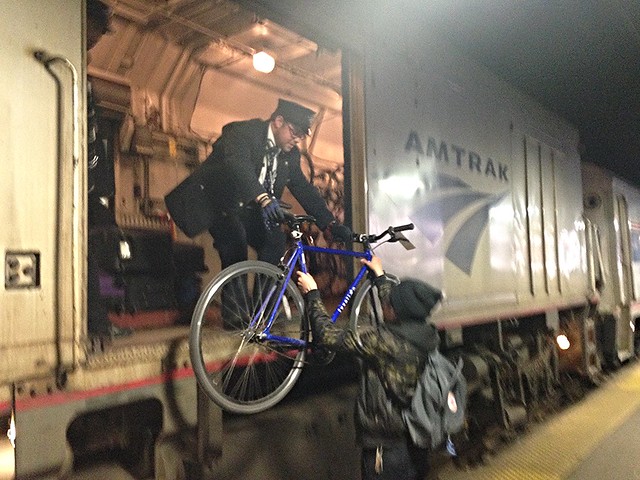
This morning as officials cut the ribbon for roll-on bike service on Amtrak’s Hiawatha Service trains, a whole new set of destinations that can easily be accessed without a car opened up for Chicago and Milwaukee residents.
While the Hiawatha line has allowed passengers to check boxed bikes as luggage for years, it's a relatively expensive and cumbersome affair. There’s a $10 surcharge each way, the boxes are $15 if you purchase them from the railway, and then you have to dissemble your bike and box it up on each leg of the trip.
Now passengers can pay a mere $5 surcharge each way and simply roll their bikes up to the baggage car, where a staffer will hang it on a vertical bike rack. The one-way adult fare for the Hiawatha Service is $25, with discounts available for ten-ride tickets and monthly passes.
Reservations are required for the roll-on service. To reserve a space for your bike, select “add bike” when booking your trip online, on the phone at 800-USA-RAIL, or when using the ticket counters or the Quik-Trak SM kiosks at both stations. Only standard-size bikes are permitted.
Yesterday I rode Metra to Kenosha, Wisconsin, with my bicycle (one-way weekday fare from the Ravenswood stop was $9) and then pedaled some 40 miles to Milwaukee for the ribbon-cutting ceremony, which was attended by a dozen or two local bike advocates.
“We have worked with [the Wisconsin Department of Transportation] by thinking 'out of the box' and mounting 15 bike racks in the [baggage car] on each of the Hiawatha trains,” said Jim Brzezinski, Amtrak’s senior regional director for state corridors. “This will make bringing your bike along on these trips more welcoming and get you on your wheels and pedaling away immediately after arrival.”
“No assembly required, starting now for bicyclists,” said John Alley, WisDOT’s transit, local roads, railroads & harbors manager. “This saves our bicycling passengers money and makes their everyday journeys or vacation trips to explore Milwaukee and Chicago so much easier.”
When the folks with bikes approached the baggage car, Amtrak employees cheerfully hauled their cycles onboard. I was asked to remove my panniers beforehand.
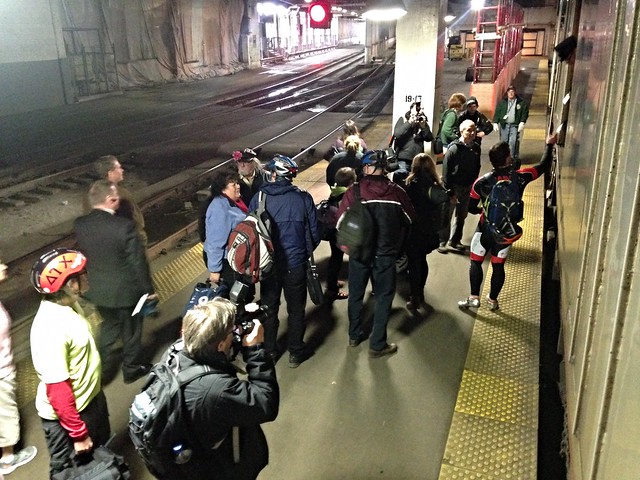
Onboard the train Amtrak spokesman Mark Magliari discussed how the new program came to be. “For years we’ve been receiving requests for roll-on service from our customers who ride bikes,” he said. “We’ve always had the desire to do this – the question was what changes we could make to accommodate that.”
Five baggage cars have been retrofitted with racks at a cost of $4,000 each, with one bike car on each Hiawatha run, Magliari said. Amtrak paid for retrofitting two cars, WisDOT paid for two, and the Michigan DOT paid for one. Why Michigan? Because next week Amtrak will be launching roll-on service on the Pere Marquette Route between Chicago and Grand Rapids, according to Magliari.
Wisconsin Bike Federation program manager Jessica Wineberg (a former Chicago Department of Transportation bike program staffer), riding the train with her son Everett, said the federation had lobbied for roll-on service for years. “We’re going to continue to advocate for roll-on service on the Empire Builder [route to the Pacific Northwest],” she said. “We also encourage Amtrak to expand roll-on service to include cargo bikes and trail-along bikes.”
Wineberg said the added convenience of roll-on service could spark an exchange program of sorts between Milwaukee and Chicago bike advocates. “People from Chicago can come up here and enjoy the great trails in our city and, on the flip side, Wisconsinites can see protected bike lanes in a dense urban environment,” she said. While Milwaukee has plenty of conventional bike lanes, it doesn't yet have protected lanes. “They’ll see how protected lanes can make downtown riding safer and more peaceful.”
Active Transportation Alliance board president Bob Hoel rode the train up from Chicago for the event. “This is great,” he said. “The roll-on service takes away many of the barriers to traveling with a bike. To some of us, our bikes are our babies, and it's stressful to have several different people manhandling your boxed bike. This way you’re turning your bike over to only one person – I felt very comfortable with it.”
Heidi Anders, an airline employee, and her daughter Molly were traveling to Chicago with their bikes for a few hours to have lunch and check out Millennium and Maggie Daley parks, including the giant playgrounds at the latter green space. “The roll-on service is fabulous,” Heidi said. “This way it will be easy to explore more of Chicago.”
But Ben Krumenauer, an Oshkosh-based transportation planner who drove down with his bike down for the ribbon-cutting, didn’t intend to linger in the Windy City – he was going to immediately turn around and pedal the 95 miles back to Milwaukee. Even though there was a stiff wind out of the north, he expected to complete the trip in a mere five hours. “I’m tenacious that way,” he said.
If you’ve ever thought about bringing a bike to Milwaukee to check out its many great museums, music venues, restaurants, cafes, and breweries, but were deterred by the cost and hassle of boxing your cycle, it’s now easier than ever to enjoy the many charms of Cream City on two wheels.
This post is made possible by a grant from the Illinois Bicycle Lawyers at Keating Law Offices, P.C., a Chicago, Illinois law firm committed to representing pedestrians and cyclists. The content is Streetsblog Chicago's own, and Keating Law Offices neither endorses the content nor exercises any editorial control.

